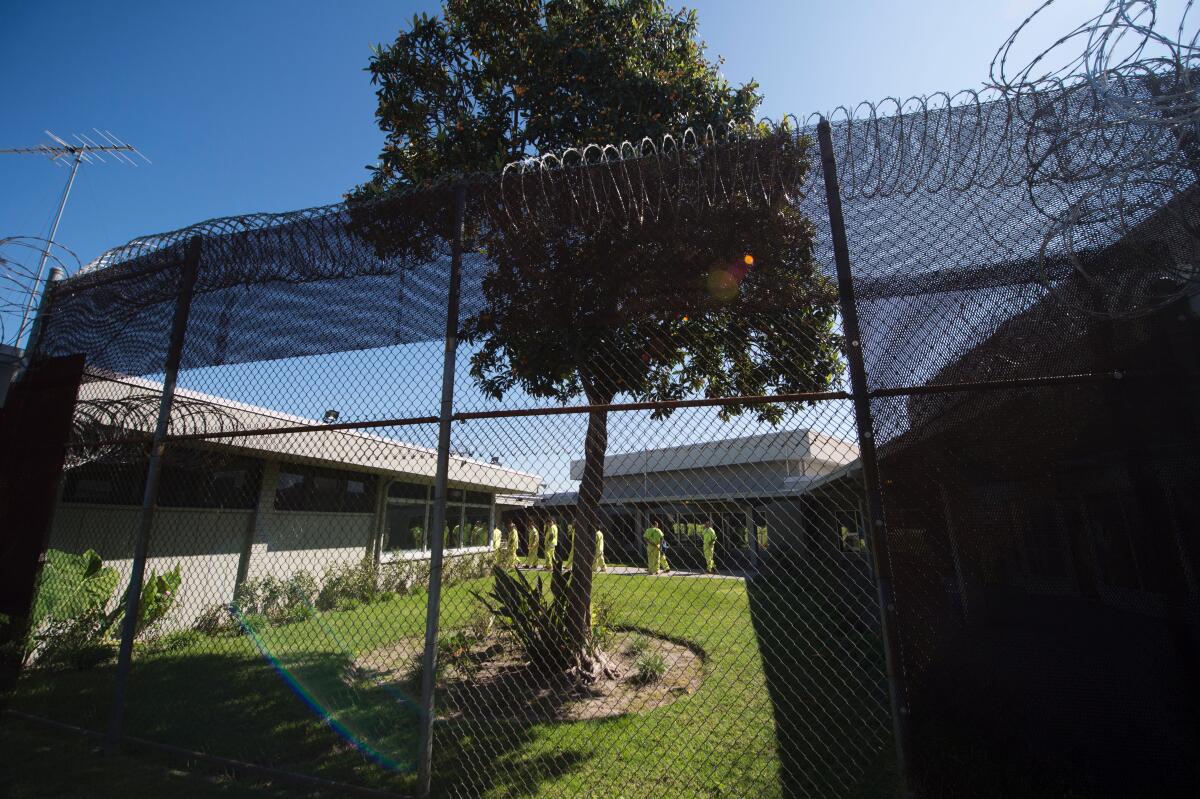‘It’s been incredibly isolating’: Orange County jails reopen to visitors

- Share via
After being separated from one another for a year, Johanna Diaz was finally able to visit her brother in jail last weekend.
Since the Orange County Sheriff’s Department suspended visitations in March 2020 due to the pandemic, Diaz and other family members and friends of inmates haven’t been able to visit their loved ones in jail. But on Friday, the department reopened limited visitations.
“It was definitely overwhelming,” Diaz said of the visit with her brother, Jose Armendariz, who is at the Theo Lacy Facility in Orange. “Seeing him behind bars, that never gets easy. But it was obviously nice to be able to see him and just physically see how he’s doing.”
Diaz said they have spoken regularly over the phone, but it was comforting to see her brother’s face and get a sense of his physical health. Armendariz is a type-1 diabetic with high blood pressure and asthma, so Diaz has been worried about his health throughout the year.
But during their visit, they largely spoke about how much weight they’d gained.
“It was great to see him face to face and talk about how we’ve all put on a couple pounds during the pandemic,” she said while laughing. “It was funny to see each other like, ‘Oh you weren’t exaggerating when you said you have gained weight during this.’”
Diaz was accompanied by her mother and daughter at the visit. They spoke with Armendariz through a phone, separated by a glass partition.
Diaz won’t be able to see her brother for another month, as the current rules only allow one visit per month for each inmate. She hopes the visits will soon be made more frequent.
The department said in a press release last week that it will continue to “reassess procedures” to determine when visitations can be expanded.
“We understand the value of visitation and know those in our custody and their loved ones have been impacted over the last year as we navigated the challenges of COVID-19,” Sheriff Don Barnes said in the press release. “We look forward to reinstating visiting in a way that is safe for all.”
Inmates have had access to two, free five-minute calls per week since March 2020. Sheriff’s spokeswoman Carrie Braun said that’s in addition to paid phone calls they can place when they have access to phones in the day room.
Sarah Kahn, a UC Irvine law student and member of Transforming Justice OC, runs a letter-writing project with inmates in Orange County jails. She said inmates had been fighting to get more contact with their loved ones over the last year.
“They have shared that it’s been incredibly isolating,” Kahn said. “There’s been a lot of organizing going on, a lot of folks on the inside are advocating for more contact with their loved one, they were only getting five-minute calls, but folks have been isolated and haven’t been able to see the faces of their families for over a year now.
“That’s on top of really harsh quarantine conditions. For large parts of COVID, people were in their cells and without access to day room, showers, phones for about 23½ hours a day. Some of them don’t have access to the library, so they’re not getting any escape. So it’s just been incredibly isolating and really devastating for folks who are incarcerated.”
Kahn criticized the department for not offering video visitations during the last year. She said they had the ability to do so because videos of court proceedings are offered and the Sheriff’s Department had enough funding.
Voice of OC reported that county supervisors allocated more CARES Act funding to the Sheriff’s Department than to healthcare workers.
“They easily could have done video visitation and they did not,” Kahn said.
Dolores Canales, a local inmate advocate, said her son John Martinez— who is incarcerated at Theo Lacy — had been advocating over the last year to get visitations back, at one point developing an online petition.
When Martinez contracted COVID-19, Canales said she was worried because she couldn’t get in contact with him.
“It’s long overdue,” Canales said of the visitations.
Daisy Ramirez, Orange County jails conditions and policy coordinator at the ACLU, said that maintaining relationships with loved ones on the outside plays a crucial role in the well-being of incarcerated individuals.
“It’s huge, especially given how long it’s been since they have been able to see their loved ones, so we are definitely pleased that incarcerated people will be able to see family members once again,” Ramirez said. “Many people that have called our hotline have shared that maintaining relationships with family members and loved ones is critical, not only to their emotional and mental well-being, but to trying to survive in the middle of a pandemic.
“I also think this makes it even more important for the Orange County Sheriff’s Department to take the necessary steps to keep COVID under control within the jails. Given this news, OCSD must keep the population low, they must offer vaccine information and access to incarcerated people and they must provide the necessary medical care and products to folks on the inside, because we know that not doing so could put people at risk.”

Ramirez and many others have criticized the Sheriff’s Department over the last year for its response to the pandemic.
“It’s really just everything that could have been done wrong, it seems like has been,” Kahn said. “They shut down the kitchen, meaning there has been for most people, pretty consistently throughout the year, no hot meals. They’re getting three sack lunches a day. It’s often a bologna sandwich, sometimes they get eggs in the morning. The food is molding. So measures like that, that cause deep harm to incarcerated people, were taken.
“But measures like taking an active role and releasing people, which Barnes resisted at every turn, could have really saved a lot of lives by allowing for more social distancing. Quarantine conditions were extremely harsh and medical care was very, very difficult to obtain. People were essentially left to their own devices when they did contract COVID.”
The American Civil Liberties Union filed a lawsuit against Barnes in April, calling for the release of medically vulnerable inmates and better safety and health protocols.
In response, a judge ordered Barnes in December to cut the county’s jail population in half. Barnes chose to fight the order, but during his appeal, an outbreak of COVID-19 in the jails spread to more than 1,000 inmates.
Barnes lost the appeal and was criticized by Judge Peter Wilson for stating that the public could be endangered by the release of inmates, a comment he made while fighting the order.
Braun said over the phone that the department submitted a plan to the court in January and the judge has not issued any new orders as the hearings continue.
Braun said the average daily jail population is down to 3,300. It was 5,200 before the pandemic. She said the judge’s order to cut the population in half referred to the pre-COVID figure.
One inmate in Orange County jails currently has tested positive for COVID-19, while 2,315 have tested positive for the virus since the pandemic began.
When asked how many inmates the department has released in response to the court order, Braun responded in an email that “the Sheriff has utilized his discretion under the declaration of emergency to release inmates since the beginning of the pandemic to manage the jail population.”
“Since the beginning of the pandemic, the sheriff has released more than 1,700 inmates who qualify based on their charges and time left on their sentence,” she said.
As COVID-19 vaccination distribution widens this month, Kahn and Ramirez expressed hope that inmates’ rights are respected.
Ramirez said the ACLU is sending out mailers to inmates with information about the vaccines to ensure they are accurately informed.
“I think the important part is making sure that incarcerated people have access to reliable information,” Ramirez said. “There is a big level of mistrust that exists between incarcerated people and jail staff. Given that, I think it’s important to make sure that people get all of their questions answered, and that they can get information from credible sources.”
All the latest on Orange County from Orange County.
Get our free TimesOC newsletter.
You may occasionally receive promotional content from the Daily Pilot.




